California Making Access Possible (MAP) to Inclusion and Belonging Winter 2025 Newsletter
Resources for Systems Change and Resources to Support Families

The California Making Access Possible (MAP) to Inclusion & Belonging Project is funded by the California Department of Social Services (CDSS) to provide a clearing house of resources to support early care and education providers in including children with disabilities in their programs.
The MAP Newsletter identifies the latest and most useful resources posted on the MAP website. This newsletter focuses on resources supporting efforts for systems change toward a more inclusive early care and education system in California and resources to help you understand and support families. Inspired by the powerful letter from the California Department of Education (CDE) stating that inclusive early education programs should be the first consideration for children with disabilities, the MAP team wants to bring attention to prominent resources that support systems change. We’ll also introduce new books and guides to help with the implementation of inclusion, alert you to professional development opportunities on inclusion, provide resources to help you understand and support families, and provide resources and a joyful 2025 calendar from Brookes Publishing to share with families.
Before getting to the main resources of this newsletter the MAP Team would like to acknowledge the tragedy caused by the Southern California wildfires. We have gathered a few key resources that may be helpful to early care and education providers and families as they cope with the aftermath of the fires. You’ll find them in the menu below.
In this issue:
- Resources for Coping with the Southern California Wildfires
- Recorded Webinar: A Guide to Helping Young Children in the Aftermath of a Crisis
- Resources for SoCal Families Affected by the Wild Fires, Early Edge
- Wildfires in California: Special Edition for ECE Providers, UCSF School of Nursing
- Children's Book: Trinka and Sam: The Big Fire
- MAP’s Coping with Trauma Web Page
- Resources Supporting Systems Change
- Rightful Presence and Inclusive Early Education Programs
- Webinar: A Blueprint for Inclusion: Supporting Systemic Change in California
- Report: California’s Success in Expanding Inclusion
- Report: Addressing Barriers to Inclusion
- Equity and Inclusion-Focused Leadership: Attitudes and Actions
- Books and Guides for the Implementation of Inclusion
- Building Blocks for Teaching Young Children in Inclusive Settings 4th Edition
- California Preschool/Transitional Kindergarten Learning Foundations
- Resource Guide for Early Childhood Itinerant Collaborative Teaching Model
- Podcast: How to Communicate the Shift to Inclusive Education to Families
- Professional Development Resources for Inclusion
- The 2025 Beginning Together Inclusion Facilitator Institute and the Inclusion Series Webinars
- STEMIE FEST 2024 Conference Recordings
- Training: Using Federal Guidance to Promote High Quality Inclusion for All Children with Disabilities
- Webinar: Being Present to Having a Presence: Family Belonging in the Pyramid Model
- Resources to Help You Understand and Support Families
- Training Resources on Kinship/Grand-family Mental Health Needs
- Becoming an Ally: Partnering with Families to Promote Student Success
- Health Equity Videos Series from the Center for Disease Control
- Adverse Childhood Experiences Fact Sheet
- Resources to Share with Families
- Start Here, A Website for Parents of Children with Disabilities
- Children's Book: Come Over to My House
- Sesame Street Workshop Resources for Emotional Well-Being, Videos
- Free Calendar! A gift from Brooke’s Publishing
1. Resources for Coping with the Southern California Wildfires
Recorded Webinar: A Guide to Helping Young Children in the Aftermath of a Crisis with Julie Kurtz
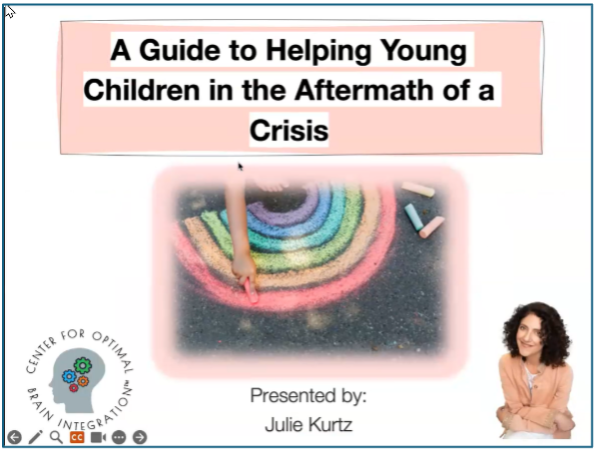
In the aftermath of a crisis, such as the recent fires in Los Angeles, it’s important to acknowledge that recovery is not immediate. While the physical damage may begin to subside as the flames cool, the emotional and psychological impact will persist for many months, especially for children, families, and those serving them, such as Head Start staff.
During this 90-minute session, Julie Kurtz from the Center for Optimal Brain Integration will guide us through essential strategies for self-care and caring for others during times of uncertainty and stress. Julie will share 10 actionable tips that you can immediately implement at home or in your workplace to better support yourself and those around you in the aftermath of a crisis.
Resources for SoCal-based Families Affected by the Wildfires
Early Edge | January 2025
Early Edge offers a web page of resources to help those affected by the fires in Southern California including Governor Newsome’s Executive Orders and other government agency resources.
Wildfires in California: Special Edition for Early Care and Education (ECE) Providers
University of California San Francisco (UCSF) School of Nursing | January 2025
This newsletter from the UCSF School of Nursing provides resources on preparation and coping with wildfires for early care and education providers. It is full of important resources and information.
- Spanish Edition for ECE Providers: Respaldar a los Programas de Cuidado Infantil y las Familias Mientras Hacen Frente a las Dificultades que Presentan los Incendios Forestales
Trinka and Sam: The Big Fire
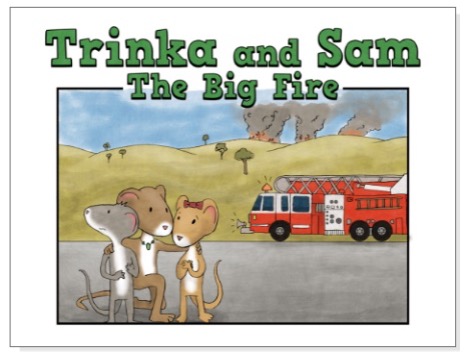
Created by Piplo Productions and the National Child Traumatic Stress Network this free downloadable children’s book was developed to help young children and their families begin to talk about feelings and worries they may have after they have experienced a large-scale fire, like a wildfire.
MAP’s Coping with Trauma Resources
Scroll through the resources to find what you need to help yourself and others cope with the tragedy of the wildfires.
2. Resources Supporting Systems Change
Systems change toward inclusion in high quality early care and education programs requires a commitment from the state and federal government. In California, that commitment is demonstrated by the December 4, 2024, “Rightful Presence” letter from California’s State Superintendent of Public Instruction, Tony Thurmond, that “reaffirms expectations and urgency of ensuring rightful presence and considering early education programs as the first placement option for special education services and supports for children with disabilities in California.” Read the letter, then find out what California is doing to promote and support inclusion by watching the recorded webinar, A Blueprint for Inclusion: Supporting Systemic Change in California, October 4, 2024. The webinar produced in collaboration with CDE’s Impact Inclusion Workgroup, and the federal Early Childhood Technical Assistance center (ECTA) lays out California’s resources for inclusion and describes the national indicators for high quality inclusion.
Rightful Presence and Inclusive Early Education Programs as the First Consideration for Children with Disabilities (PDF)
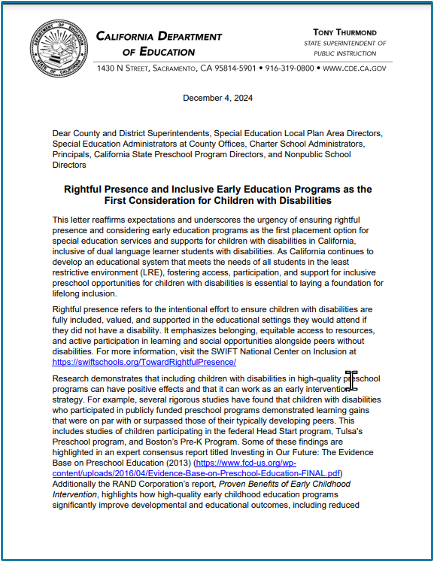
California Department of Education | December 4, 2024
“This letter reaffirms expectations and underscores the urgency of ensuring rightful presence and considering early education programs as the first placement option for special education services and supports for children with disabilities in California, inclusive of dual language learner students with disabilities. As California continues to develop an educational system that meets the needs of all students in the least restrictive environment (LRE), fostering access, participation, and support for inclusive preschool opportunities for children with disabilities is essential to laying a foundation for lifelong inclusion. Rightful presence refers to the intentional effort to ensure children with disabilities are fully included, valued, and supported in the educational settings they would attend if they did not have a disability. It emphasizes belonging, equitable access to resources, and active participation in learning and social opportunities alongside peers without disabilities.”
For more information, visit the SWIFT National Center on Inclusion website
A Blueprint for Inclusion: Supporting Systemic Change in California

October 4, 2024
The California Department of Education (CDE), in partnership with the Impact Inclusion Workgroup, collaborated with the Early Childhood Technical Assistance Center (ECTA) in hosting a webinar in which the ECTA provided an overview of the Indicators of High-Quality Inclusion .
In this webinar, the CDE provided an overview of California’s efforts to support inclusion of children with disabilities in the early learning and care field, including resources available for programs. Following the overview, ECTA provided an overview of the four sets of indicators including: state indicators, community indicators, local program indicators, and early care and education environment indicators. These four sets of indicators were designed by a group of national partners to respond to the evolving needs of the early childhood education system and serve as a capacity building tool to help teams discuss barriers to inclusion and develop effective solutions.
Reports on California’s Success in Expanding Inclusion
The Inclusive Early Education Expansion Program (IEEEP) is discussed in the blog posts and the final report of the IEEEP Evaluation.
Helping Early Education Providers Support Children with Disabilities
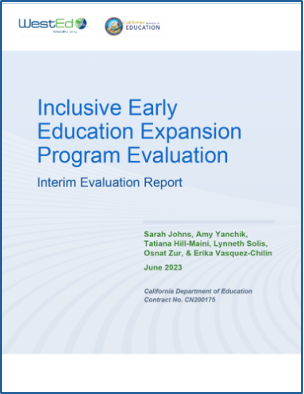
Sarah Johns, WestEd | November 4, 2024
WestEd partnered with the CDE to conduct an evaluation of the Inclusive Early Education Expansion Program (IEEEP ), a statewide grant program in California designed to expand access to inclusive early education programs for children with disabilities, including those with severe or significant conditions. In a previous blog post about the IEEEP evaluation , we highlighted the importance of collaboration between general and special education entities, as well as key investments that supported successful efforts to expand inclusive education across early learning programs in California.
In this blog post, Sarah Johns, a Senior Research Associate at WestEd, talks about the findings from the IEEEP evaluation related to the impact of professional development on early care and education programs throughout California.
For more information about the results of the evaluation, see the report here: Inclusive Early Education Expansion Program Evaluation Interim Evaluation Report, WestEd, June 2023
Addressing Barriers to Inclusion
A report by the Government Accountability Office on Child Care Accessibility and a resource for leaders from ECTA address barriers to inclusion. The barriers identified are a reminder of the ongoing challenges faced by families and leaders that need to be addressed to ensure that children with disabilities are truly included in early care and education programs.
Child Care Accessibility: Agencies Can Further Coordinate to Better Serve Families with Disabilities
Government Accountability Office (GAO) | September 12, 2024
What GAO Found
An estimated 2.2 million children, aged 5 and under, and 3 million parents of children in this age group have a reported disability, according to GAO's analysis of the 2019 Early Childhood Program Participation Survey and the 2022 Survey of Income and Program Participation data.
Families of children with disabilities and parents with disabilities—including physical, intellectual, and developmental disabilities—reported various barriers to finding and using child care programs, which affected their family's well-being. For example, when searching for child care, parents could not easily find information about programs that could serve children with disabilities. Parents with disabilities reported difficulties communicating with their child care provider and instances in which they faced exclusion or disparaging comments from staff or other parents. Parents' difficulties finding and maintaining appropriate child care resulted in some reducing their work hours, leaving their jobs, or moving their families to new locations.
Barriers to Participating in Child Care Programs Described by Parents of Children with Disabilities
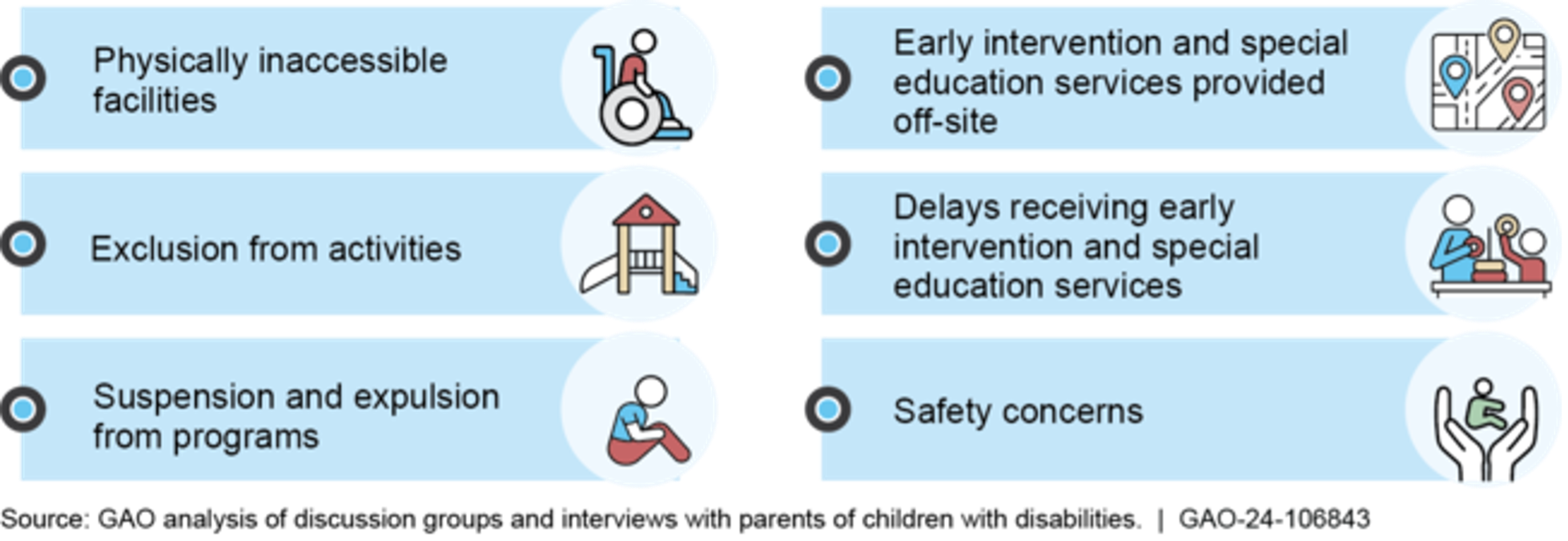
- Physically inaccessible facilities
- Exclusion from activities
- Suspension and expulsion from programs
- Early intervention and special education services provided off-site
- Delays receiving early intervention and special education services
- Safety concerns
Blog Post: Think Child Care is Hard to Find? It’s Even Tougher for Children, Parents with Disabilities, September 17, 2024
Equity- and Inclusion-Focused Leadership: Attitudes and Actions

Early Childhood Technical Assistance Center (ECTA) | May 24, 2024
A new resource from the Early Childhood Technical Assistance (ECTA) Center provides the steps, Part B and Part C, leaders and Inclusion Facilitators must take to identify and address barriers to inclusion and equity.
As a leader, you play a vital role in dismantling inequities that impact children with suspected or identified disabilities. This isn't a linear or easy process and requires you to understand the critical perspectives of families, staff of color, and those with disabilities. Equity- and inclusion-focused leaders share five attitudes and actions. These attitudes and actions help them prioritize equity and inclusion in concrete and impactful ways so that each and every child can meet their fullest potential. Explore the attitudes and actions on the ECTA website , to learn how you can be a leader for inclusion an equity.
3. Books and Guides for Implementation of Inclusion
Implementation of inclusion requires knowledge of inclusive practices as well as a foundational understanding of the knowledge and skills that most children, aged three to five and a half, typically develop in high-quality early education programs. The books described below meet those needs! Other resources offer a guide to itinerant teaching and a podcast on how to talk to families about inclusion.
Building Blocks for Teaching Young Children in Inclusive Settings, Fourth Edition
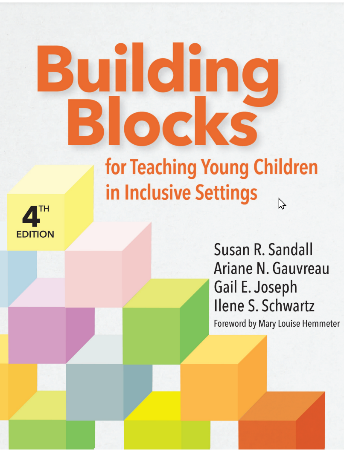
“Like the groundbreaking previous editions, this updated Building Blocks guide gives pre- and in-service teachers three types of practical, evidence-based inclusion strategies: curriculum modifications, embedded learning opportunities, and child-focused instructional strategies. Educators will find ready-to-use tips and guidance on key topics, from fostering friendships to promoting positive behavior.”
Watch the webinar for a quick introduction and to see what’s new in the 4th edition.
California Preschool/Transitional Kindergarten Learning Foundations (PTKLF)
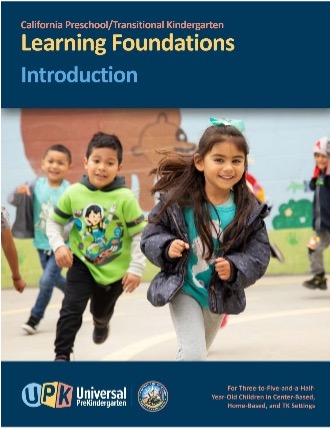
The California Preschool/Transitional Kindergarten Learning Foundations describe knowledge and skills that most children, aged three to five and a half, typically develop in high-quality, equitable, and responsive early education programs, including Transitional Kindergarten (TK), the California State Preschool Program (CSPP), and other federal and publicly funded and private preschool programs. The foundations are designed to recognize that the early education years are a time of major physical, cognitive, language, and social–emotional growth.
Young children are curious and eager to explore and make sense of their world. Through child-led play, exploration, and interaction with adults and peers at home and in the early education environment, children develop skills that set the foundation for success in school and life. During this period, children engage in more conversations and shared activities with others, form relationships with peers, and learn to regulate emotions and behaviors with less adult support. They continue to expand their language skills in their home languages, English or other languages, and develop foundational skills in early literacy, math, and science.
Resource Guide for Early Childhood Itinerant Collaborative Teaching Model (PDF)
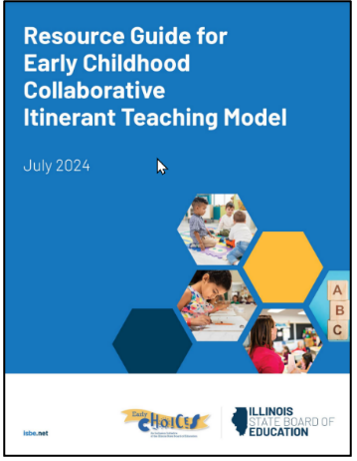
Early Choices, Illinois State Board of Education | July 2024
This Resource Guide for the Early Childhood Collaborative Itinerant Teaching Model was developed by Early Choices and the Illinois State Board of Education. It draws from the Policy Statement on Inclusion of Children with Disabilities in Early Childhood Programs, updated in November 2023, by the U.S. Department of Health and Human Services and the U.S. Department of Education which strongly supports the provision of itinerant ECSE Collaborative services. It was developed as a roadmap for service providers (educators, caregivers, special educators, related services providers, administrators, and coaches) when implementing inclusive services in community-based organizations in partnership with Local Educational Agencies (LEA). At the center of an early childhood collaborative itinerant teaching model is the premise of providing systemic supports so that children and families can be served wherever they are together.
Within an Early Childhood Collaborative Itinerant Teaching Model, the early childhood classroom teacher and the itinerant early childhood special education teacher plan collaboratively how to best embed individualized designed learning opportunities into the classroom routines, using collaborative planning strategies to complete the process effectively, and to ensure adequate professional development is available and provided to all personnel. In addition to instruction, the collaborative team also determines the best strategies for monitoring the child’s progress to ensure learning continues to take place.
The Inclusion Podcast-Episode 33: How to Communicate the Shift to Inclusive Education to Families
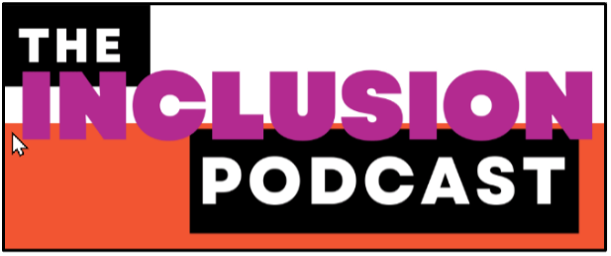
Julie Causton and Kristie Pretti-Frontczak describe the key takeaways from their podcast episode that provides talking points to address family concerns about inclusion and gives you access to additional resources on the topic:
- Families’ resistance to inclusion often stems from past messaging that separate, specialized services were better, requiring educators to reframe inclusion as both legally aligned and beneficial for their children.
- Inclusive education requires access to general education content, curriculum, and peers, ensuring classrooms reflect natural proportions of students with and without disabilities.
- True inclusion pairs placement in general education with tailored supports, adaptations, and collaborative efforts to meet each student’s unique needs effectively.
- For more information see the article, 5 Strategies to Ensure an Inclusive Placement for Your Child (PDF)
- See Inclusive Schoolings Family Resource Page
4. Professional Development Resources for Inclusion
Virtual and In-Person Webinars
Learn about and register for these professional development webinars on inclusion.
2025 Beginning Together Inclusion Facilitator Institute
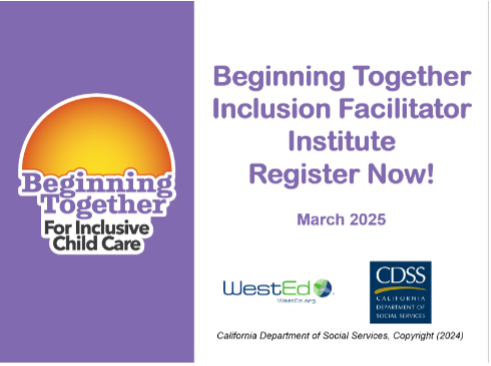
Join Us! Become an Inclusion Facilitator! In March 2025, Beginning Together will hold a virtual Institute for Inclusion Facilitators with Training-of-Trainer’s sessions, offered as a combination of synchronous and asynchronous activities.
Visit the Beginning Together website to download the flyer and register .
Free Inclusion Series Webinars
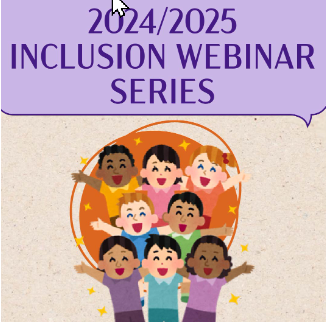
The free Inclusion Webinar Series, offered by the California Department of Social Services in collaboration with WestEd, is followed by the opportunity to participate in collaborative conversations to help you apply the learning to your work. This Webinar Series is offered in both English and Spanish.
- Inclusion Works Part 1, January 23, 2025
- Inclusion Works Part 2, March 6, 2025
- Inclusion Works Part 3, April 24, 2025
International Early Childhood Inclusion Institute

May 13-15, 2025 | Virtual and In-person | Chapel Hill North Carolina
Registration is now open! In recognition of our quarter-century milestone, our theme is, “Honoring Our 25 Year History—Reflecting, Celebrating, and Advancing.” Jordyn Zimmerman's this year’s keynote speaker. Zimmerman is an educator and disability advocate who uses her personal experience as an autistic individual who gained access to augmentative communication at 18 to challenge the status quo and promote inclusive learning.
Recorded Conferences and Training
Gain access to strategies for classroom inclusion from the STEMIE Fest 2024 Conference, a training based on the 2023 revised federal Policy Statement on Inclusion and a webinar on family belonging in the Pyramid Model.
STEMIEFest 2024

Organized by the US Department of Education funded STEM Innovation for Inclusion in Early Education , STEMIEFest is a gathering of families, early childhood and early childhood special education professionals, faculty, and more, to engage young children with and without disabilities in innovative STEM learning experiences every day and everywhere. View recorded sessions from the STEMIEFEST 2024 Conference to learn about evidence-based practices for teaching a wide range of topics with an emphasis on STEM.
Using Federal Guidance to Promote High Quality Inclusion for All Children with Disabilities
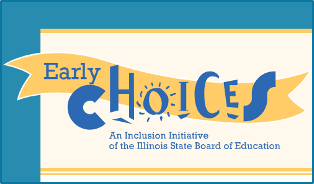
Early Choices Training Module | September 2024
This module developed by Early CHOICES reviews of the Federal Policy Statement on Inclusion of Children with Disabilities in Early Childhood Programs that was updated and re-issued by the U.S. Department of Health and Human Services and U.S. Department of Education on November 23, 2023.
The companion Reflection Guide can be used to reflect on current inclusive practices, consider ways to further advance inclusion, and explore helpful resources for you and your program or community. Links to all the resources mentioned in the modules are also in the reflection guide.
Being Present to Having a Presence: Family Belonging in the Pyramid Model
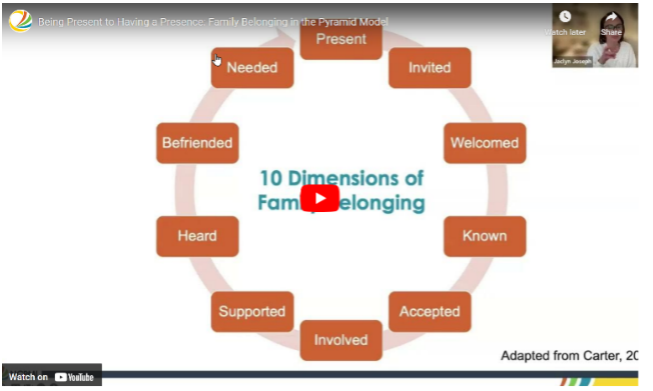
This webinar introduces 10 dimensions of belonging and explores how Pyramid Model programs, providers, and policies can progress beyond family engagement. Presenters will share practical examples for designing and cultivating environments and experiences that celebrate families’ strengths and value their essential role in the community, fostering a meaningful quality of life for all.
5. Resources to Help You Understand and Support Families
Learning more about the needs and challenges of the people that you work with can help you become a more effective teacher, administrator, coach, or collaborator. Explore the mental health needs of kinship/grandfamilies, how to partner with immigrant families, videos about health equity from the Center for Disease Control and a 12-page fact sheet about adverse childhood experiences (ACES) from the Child Safety Network in this set of resources.
Guide for Providers: No-Cost Training Resources on Kinship/Grandfamily Mental Health Needs

The resources in this guide contain information useful to staff from a range of professional backgrounds. Most can be read, viewed, or completed in 60 minutes or less (some in less than 15 minutes). Spanish-language resources are included when available.
The resources offer an introduction to the mental health needs of kinship/grandfamilies, and the stressors commonly faced by this population, as well as tips on supporting kinship/ grandfamilies. However, these resources do not include instruction on mental health treatment, which should only be conducted by trained and licensed mental health professionals.
Becoming an Ally: Partnering with Immigrant Families to Promote Student Success
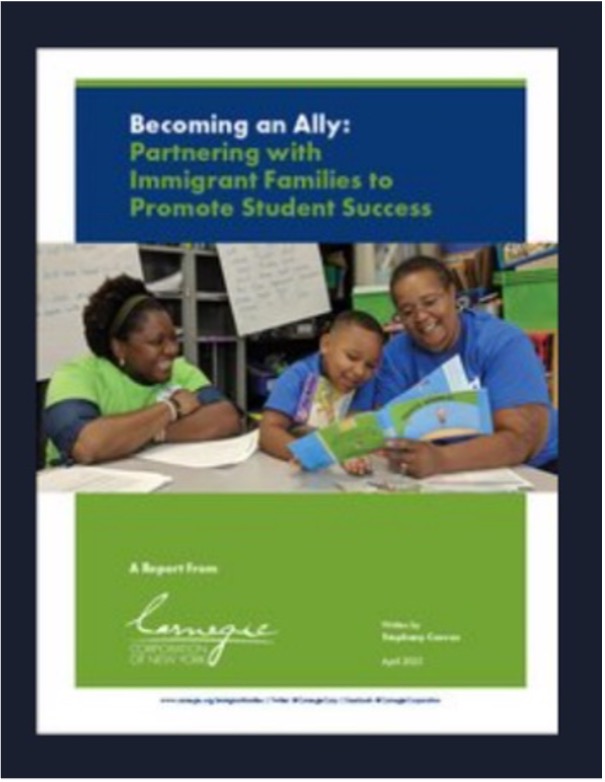
“To provide all children with an excellent education, educators must understand the needs of immigrant families and how to meet them. This report offers recommendations to guide educators in engaging immigrant families as true partners in their children’s learning.” — Stephany Cuevas, author of Becoming an Ally: Partnering with Immigrant Families to Promote Student Success
This report, commissioned by the Carnegie Corporation, published in April 2024, challenges partners in the American educational system to build effective and equitable family engagement practices with immigrant families. It provides recommendations for school leaders, educators, funders, and policymakers to support a high-quality education for every immigrant child.
Health Equity Video Series
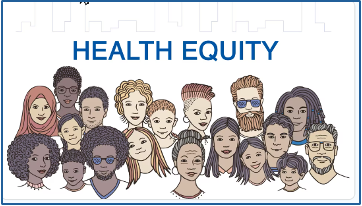
Center for Disease Control (CDC) | July 15, 2024
CDC’s Office of Health Equity created a series of short informative videos on the topics of health equity, social determinants of health, racism and health, and intersectionality. These videos help provide an awareness of the impact of inequity on the health of various populations.
Adverse Childhood Experiences (ACE) Fact Sheet
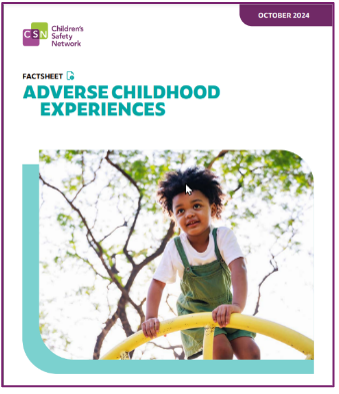
Child Safety Network | October 2024
This 12-page fact sheet provides: Information on ACEs, including the types of and consequences of ACEs. The most recent data from the 2021– 2022 National Survey of Children’s Health (NSCH) on ACEs prevalence and disparities. Recommended best practices from various leading organizations, such as the Centers for Disease Control and Prevention (CDC), and published studies to highlight programs and strategies to prevent and reduce ACEs.
6. Resources to Share with Families
Families of children with disabilities are on a unique journey. The Start Here website can provide a guide for what to expect and how to navigate the services, education and emotions that are part of this journey. Become familiar with what the website has to offer and get on the mailing list and then recommend it to families!
The children’s book, Come Over to My House, is a good one to have in your own library, but is also a fun book to share with families to normalize disability and encourage play dates.
You might also want to share the Sesame Street Resources for Emotional Well-Being with families. They provide a positive message and strategies for managing issues and emotions!
Start Here, A Website for Parents of Children with Disabilities
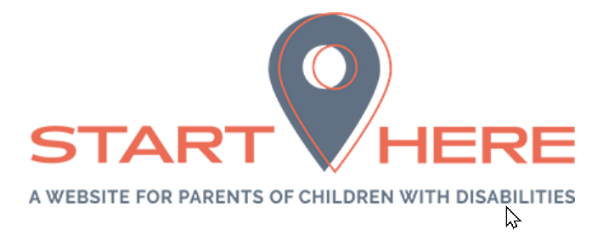
Welcome to a community that is not for children with disabilities but for the people who love them and know them best: their parents. Every child is different and all of us can use helpful support along the way. That’s especially true in the early days, when most parents have more questions than answers and need helpful guidance they can trust. As people with many decades of experience caring for people with challenges and their families, we invite you to “start here.”
Under the category, What’s New you’ll find a variety of resources worth investigation. Many are supports for social and emotional development. The Early Childhood Transitions Guide and Books for Children with Disabilities have immediately useful information.
The website was created by a collaboration between United Cerebral Palsy and ADAPT Community Network.
Come Over to My House: CBCA Notable Book by Eliza Hull and Sally Rippin
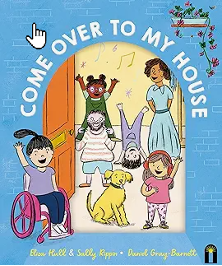
Amazon | 2023
Come Over to My House is a delightful picture book that explores the home lives of children and parents who are Deaf or disabled.
Co-written by disability advocate Eliza Hull and bestselling author Sally Rippin, the inclusive rhyming text authentically explores the characters' various disabilities.
A cast of friendly characters invite friends over for a play – there’s fun to be had, food to eat and families to meet!
This is the perfect book to start a conversation about disability and inclusion with parents, care-givers and children.
The inclusive text normalizes rather than emphasizes the characters' various disabilities. Disabilities are often only shown in the illustrations, not spelt out in the text. This allows the characters' personality to shine brighter than their difference.
Sesame Street Workshop Resources for Emotional Well-Being
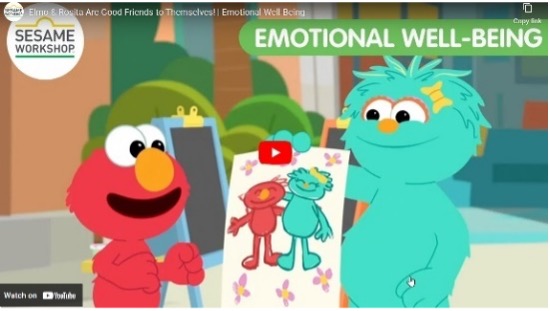
Strategies for self-compassion are demonstrated in a discussion by Elmo and Rosita.
Watch the video with children and talk about how Rosita was a good friend to herself when she was frustrated about making a mistake. When children are in distress and it’s appropriate, spend a quiet moment with them and invite them to pause to show kindness to themselves. They can close their eyes, belly breathe, put their hands on their heart, and repeat phrases such as:
- Everyone feels ____ sometimes.
- Everyone makes mistakes. Mistakes are a part of learning.
- I can be a good friend to myself!
Be sure to take a look at the links to related videos also available here including the introduction of Sofia the Feelings Helper
7. A Gift from Brookes Publishing for 2025
Finding Joy 2025 Calendar, Brookes Publishing
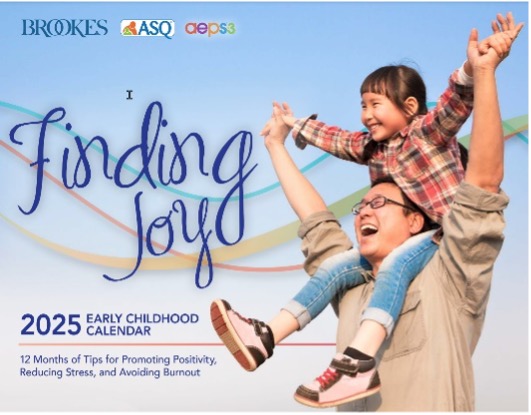
Give yourself an infusion of joy all year long with this free 2025 calendar from brookes Publishing, featuring tips from Brookes experts on reducing stress, avoiding burnout, and enjoying small moments of positivity.
Direct questions or comments about this newsletter to map@wested.org
